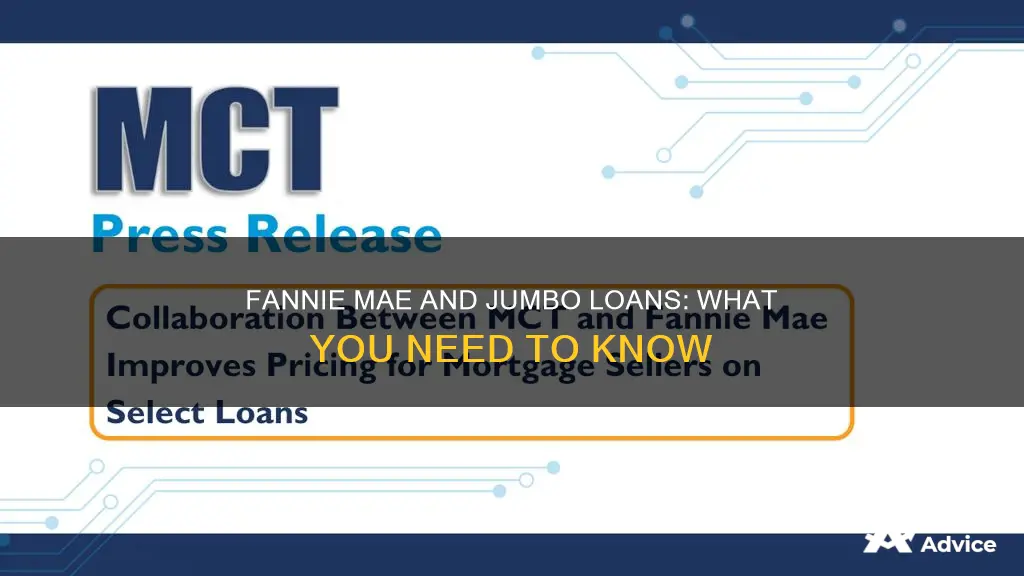
Fannie Mae and Freddie Mac are government-sponsored enterprises (GSEs) that play a major role in the U.S. mortgage market. They do not deal with jumbo loans, which are considered non-conforming because they exceed the conventional loan limits set by the GSEs. Jumbo loans are often securitized by other financial institutions for sale to investors.
| Characteristics | Values |
|---|---|
| Does Fannie Mae buy jumbo loans? | No |
| Who buys jumbo loans? | Other financial institutions for sale to investors |
| What is a jumbo loan? | A type of financing that exceeds the conventional loan limits set by the government for purchase by Fannie Mae or Freddie Mac |
| What is the baseline conforming loan limit for a single-family home in 2024? | $750,000 |
| What is the upper limit for conforming loans in 2025? | $806,500 to $1,209,750 depending on location |
What You'll Learn
- Jumbo loans are not eligible for purchase, guarantee, or securitisation by Fannie Mae
- Jumbo loans are considered non-conforming and exceed the loan limits set by Fannie Mae
- Jumbo loans are more expensive to acquire than conventional loans
- Jumbo loans are for high-income earners who lack the cash to buy an expensive home outright
- Jumbo loans have more stringent underwriting requirements

Jumbo loans are not eligible for purchase, guarantee, or securitisation by Fannie Mae
Jumbo loans are a type of home mortgage that exceeds the lending limits set by the Federal Housing Finance Agency (FHFA) for conventional mortgages. The FHFA publishes annual conforming loan limit values that apply to all conventional loans delivered to Fannie Mae. These include baseline and high-cost area loan limits, which vary by geographic location.
Fannie Mae is a government-sponsored enterprise (GSE) that plays a major role in the U.S. mortgage market. It was created by the U.S. Congress in 1938 with the primary goal of ensuring a steady flow of funds to mortgage lenders. By purchasing loans from banks and other mortgage lenders, Fannie Mae provides liquidity to the housing market, making it easier for lenders to issue new loans.
However, jumbo loans are not eligible for purchase, guarantee, or securitisation by Fannie Mae. This is because jumbo loans exceed the conventional loan limits set by the government for purchase by Fannie Mae. As a result, jumbo loans are considered non-conforming loans. Since they are not backed by Fannie Mae, jumbo loans carry more risk for the lender and are more expensive to acquire. For example, closing costs and origination fees are typically calculated as a percentage of the sale, resulting in higher fees for higher-priced properties.
Jumbo loans are typically used to finance luxury properties and homes in very expensive real estate markets. They are most appropriate for high-income earners who have substantial incomes but lack the cash to buy an expensive home outright. Borrowers must meet stringent underwriting requirements, including more rigorous credit requirements than those who apply for a conventional loan. Approval requires an excellent credit score and a very low debt-to-income (DTI) ratio.
FAFSA Loan Awards: What You Need to Know
You may want to see also

Jumbo loans are considered non-conforming and exceed the loan limits set by Fannie Mae
A jumbo loan is a type of financing used to purchase properties that are too expensive for a conventional conforming loan. The Federal Housing Finance Agency (FHFA) publishes annual conforming loan limit values that apply to all conventional loans delivered to Fannie Mae. These include baseline and high-cost area loan limits, which vary by geographic location. In most parts of the US, the maximum amount for a conforming loan in 2025 is $806,500, but this can go up to $1,149,825 in certain more expensive areas.
Jumbo loans are considered non-conforming because they exceed the loan limits set by Fannie Mae and Freddie Mac. These loans cannot be guaranteed by Fannie Mae, which means that the lender is not protected from losses if the borrower defaults. As a result, jumbo loans are considered riskier for lenders and generally remain on the lenders' own books as a type of portfolio loan.
Jumbo loans have stricter qualification rules and underwriting criteria than conforming loans. To be approved for a jumbo loan, borrowers typically need a high credit score of 700 or above, a low debt-to-income (DTI) ratio, and sufficient income and assets to keep up with the payments. Lenders will also consider the borrower's DTI to ensure they do not become over-leveraged, although they may be more flexible if the borrower has solid financials or plentiful cash reserves.
Jumbo loans are also more expensive to acquire, with higher closing costs and origination fees, and borrowers may get fewer tax breaks on larger mortgages. Down payment requirements for jumbo loans have loosened over the years, and while they used to carry significantly higher interest rates than conventional mortgages, the gap has narrowed in recent years.
Conforming Loan Limits: Fannie Mae's Role and Impact
You may want to see also

Jumbo loans are more expensive to acquire than conventional loans
A jumbo loan, also known as a jumbo mortgage, is a type of financing that exceeds the conventional loan limits set by the Federal Housing Finance Agency (FHFA) for purchase by Fannie Mae or Freddie Mac. As a non-conforming loan, lenders cannot sell jumbo loans to Fannie Mae or Freddie Mac. Since they take all the risk on jumbo mortgages, jumbo loans are more expensive to acquire than conventional loans.
Jumbo loans are considered riskier for lenders because they are not guaranteed or securitized by Fannie Mae or Freddie Mac. Jumbo loans also carry more risk simply because more money is involved. As a result, lenders may require borrowers to have at least a year of loan payments saved up. This is in contrast to conforming loans, which require no cash reserves if you are buying a one-unit primary residence.
Jumbo loans also have more stringent lending guidelines and eligibility criteria due to their risky nature. Borrowers must meet more rigorous credit requirements than those who apply for a conventional loan. Approval requires a stellar credit score—preferably above 700—and a very low debt-to-income (DTI) ratio. The minimum accepted credit score is higher for a jumbo loan than for a conventional loan, with a minimum of 700 for the former and 620 for the latter.
Additionally, jumbo loans have higher down payment requirements than conventional loans. While conventional loans may require a down payment of 10% to 15%, jumbo loans have historically required a down payment of 30%, although this figure has fallen to as low as 10% in some cases. Higher down payments can help borrowers avoid the cost of private mortgage insurance (PMI), which lenders require for loans with down payments under 20%. However, it is important to note that mortgage insurance is not always required for jumbo loans, as the down payment requirement may already meet or exceed this threshold.
Finally, jumbo loans have higher closing costs than conventional mortgages because they are large loans. Closing costs and origination fees are typically calculated as a percentage of the sale, which adds up quickly on higher-priced properties. Borrowers with jumbo loans also get fewer tax breaks on larger mortgages. For example, in 2024, the mortgage interest deduction cap was $750,000 for properties purchased after December 16, 2017. If a borrower holds a mortgage worth $1 million or more, they can only deduct interest on the first $750,000 of the loan.
MPN Student Loans: Who Needs to Fill Them Out?
You may want to see also

Jumbo loans are for high-income earners who lack the cash to buy an expensive home outright
A jumbo loan, also known as a jumbo mortgage, is a type of financing that exceeds the conventional loan limits set by the government for purchase by Fannie Mae or Freddie Mac. In 2025, the maximum amount for a conforming loan in most counties in the US is $806,500, as determined by the Federal Housing Finance Agency (FHFA). However, in certain high-cost areas, such as Hawaii, Alaska, and some counties with higher median home prices, the limit can be as high as $1,149,825 to $1,209,750.
Jumbo loans are designed for high-income earners who lack the cash to buy an expensive home outright. These individuals typically have an annual income ranging from $250,000 to $500,000 and are referred to as HENRYs, an acronym for "high earners, not rich yet." Financial institutions often target this segment for long-term products as they may require additional wealth management services.
To qualify for a jumbo loan, borrowers typically need a high credit score of 700 or above, a low debt-to-income (DTI) ratio, and evidence of sufficient income and assets to make the payments. Lenders may also require a higher FICO score, ample cash reserves, and extensive documentation of financial health, including tax returns, W-2s, 1099s, bank statements, and investment account information.
Jumbo loans have stricter qualification rules and are more expensive to acquire due to higher closing costs and origination fees, which are calculated as a percentage of the sale. Additionally, borrowers may receive fewer tax breaks on larger mortgages as there is a cap on the mortgage interest deduction for properties valued above a certain threshold.
Unlike conventional mortgages, jumbo loans are not eligible for purchase, guarantee, or securitisation by Fannie Mae or Freddie Mac, increasing the risk for lenders. As a result, jumbo loans are often securitised by other financial institutions and sold to investors.
Experian Loans: What You Need to Know
You may want to see also

Jumbo loans have more stringent underwriting requirements
Jumbo loans are a type of home mortgage that exceeds the lending limits set by the Federal Housing Finance Agency (FHFA) for conventional mortgages. They are not eligible to be purchased, guaranteed, or securitized by Fannie Mae or Freddie Mac. As a result, jumbo loans are considered riskier for lenders and have more stringent underwriting requirements.
Jumbo loans are often used to finance luxury properties and homes in expensive real estate markets. The requirements for these loans tend to be more stringent than those for conforming loans. Borrowers typically need to meet more rigorous credit requirements, including an excellent credit score of 700 or above and a very low debt-to-income (DTI) ratio. Lenders may also require proof of sufficient income, cash reserves, and liquid assets.
The down payment requirements for jumbo loans have loosened over the years, falling to as low as 10% in some cases. However, most lenders will require a minimum down payment of 20%, and some may require even more. Borrowers should be prepared to provide recent pay stubs, bank statements, tax returns, and documentation of their non-liquid assets and other loans.
Unlike conventional or government-backed loans, jumbo loans are usually manually underwritten. This means that a mortgage underwriter personally reviews the borrower's financial details in-depth to weigh the higher risks associated with jumbo loans. This allows the lender to make a more informed decision and ensure that the borrower can handle the financial commitment.
It is important to note that not every lender offers jumbo loans, and the terms and rates can vary between them. Homebuyers considering a jumbo loan should thoroughly research the available options in their area and consult a qualified home lending advisor to find the best loan for their financial goals and preferences.
Fannie Mae: Loan Assumptions and Their Complexities
You may want to see also
Frequently asked questions
A jumbo loan, also known as a jumbo mortgage, is a type of financing that exceeds the conventional loan limits set by the government for purchase by Fannie Mae or Freddie Mac.
No, Fannie Mae does not buy jumbo loans. This is because jumbo loans exceed the loan limits set by Fannie Mae and Freddie Mac.
The requirements for a jumbo loan are more stringent than those for a conventional loan. Borrowers must meet more rigorous credit requirements, including an excellent credit score and a very low debt-to-income (DTI) ratio.
Jumbo loans are considered riskier for lenders because they are not guaranteed by Fannie Mae or Freddie Mac, and because more money is involved.







